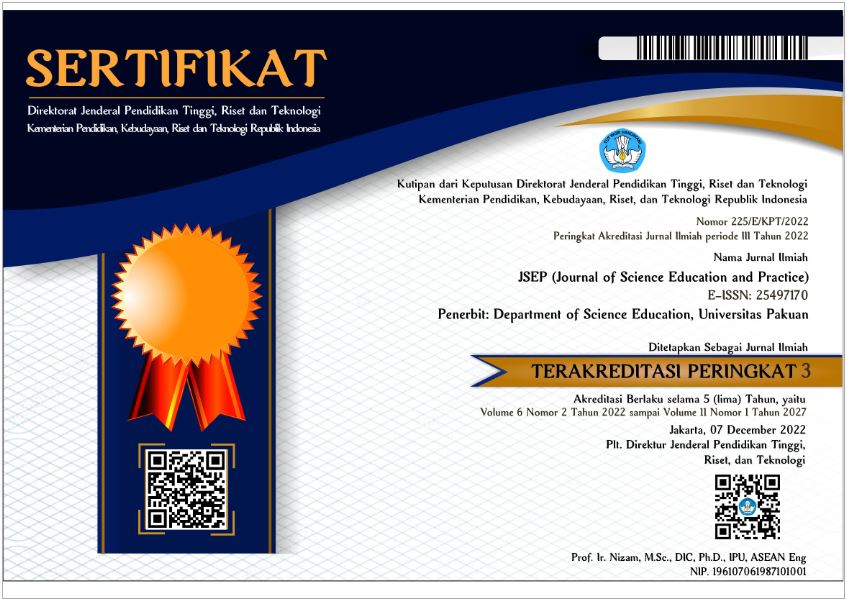ADDITIONAL MENU
Inquiries and Problem Based Learning (Pbl) Assistant Multimedia Learning Models in Improving Students' Critical Thinking Skills
Abstract
Keywords
References
Abdi, Ali. 2014. The Effect of Inquiry-based Learning Method on Students' Academic Achievement in Science Course. Universal Journal of Educational Research. Volume 2 No. 1:37-41.
Astika, I. Kd. Urip. 2013. The Effect of Problem-Based Learning Model on Scientific Attitudes and Critical Thinking Skills. Journal of Ganesha University of Education Graduate Programs. Volume 3 No. 1:23-30
Ayuningrum, Diah. 2015. The Effect of Problem Based Learning Model on Critical Thinking Skills of High School Students on Protist Material. Unnes Journal of Biology Education. Volume 4 No. 2: 124-133.
Ennis, H. Robert. 1991. Critical Thinking. University of Illinois. Prentice Hall, Upper Saddle River, NJ 07458
Fathurrohman, M. 2015. Innovative Learning Models. Jogjakarta: Ar-Ruzz Media
Jufri, A. Wahab. 2013. Learning and Learning Science. Bandung: Cipta Engineering Library.
Kusumaningtias, Anyta. 2013. Effect of Problem Based Learning Combined Numbered Heads Together Strategy on Metacognitive Ability, Critical Thinking, and Biological Cognitive. Journal of Educational Research. Volume 23 No. 1:34-47.
Mudlofir, Ali. 2016. Innovative Learning Design. Jakarta: PT RajaGrafindo Persada.
Nurun, Yunin. 2014. Application of Problem Based Learning Model to Improve Critical Thinking Skills and Student Learning Outcomes. Journal of Vocational Education. Volume 1 No. 1: 125-144.
Novvy, Eka. 2016. Improving the Mastery of Concepts and Critical Thinking Skills of Students through the Implementation of the Inquiry Learning Model on the Main Material of the Buffer Solution. Journal of Chemistry and Chemistry Education. Volume 1 No. 1: 67-74.
Personal, Benny A. 2009. Learning System Design Model. Jakarta: Dian Rakyat
Rusman. 2012. Learning Models: Developing Teacher Professionalism. Jakarta: Rajawali Press.
Rusmono. 2012. Learning Strategy with PBL to improve Teacher Professionalism. Jakarta.
Rubini, Bibi. 2013. Building Learning Community to Enhance Staff's Capability in Basic Science Learning for non-Science Students. International Journal of Scientific & Engineering Research. Volume 4 No. 12: 128-133
Sadiman, Arif S. 2011. Educational Media. Jakarta. Press Eagle.
Sanjaya, W. 2006. Learning Strategies. Jakarta: Prenada Media Group.
Trianto. 2007. Constructivistic Oriented Innovative Learning Models. Surabaya: Library Achievement.
Ullinuha, Lia. 2015. The Effect of Problem Based Learning (PBL) on Critical Thinking Ability of Class X Students of SMA Negeri 6 Surakarta in the 2012/2013 Academic Year. Journal of Biological Education. Volume 7 No, 1: 40-51.
DOI: 10.33751/jsep.v5i2.5702
 Abstract views : 290
Abstract views : 290
Refbacks
- There are currently no refbacks.
Copyright (c) 2021 JSEP (Journal of Science Education and Practice)

This work is licensed under a Creative Commons Attribution 4.0 International License.












